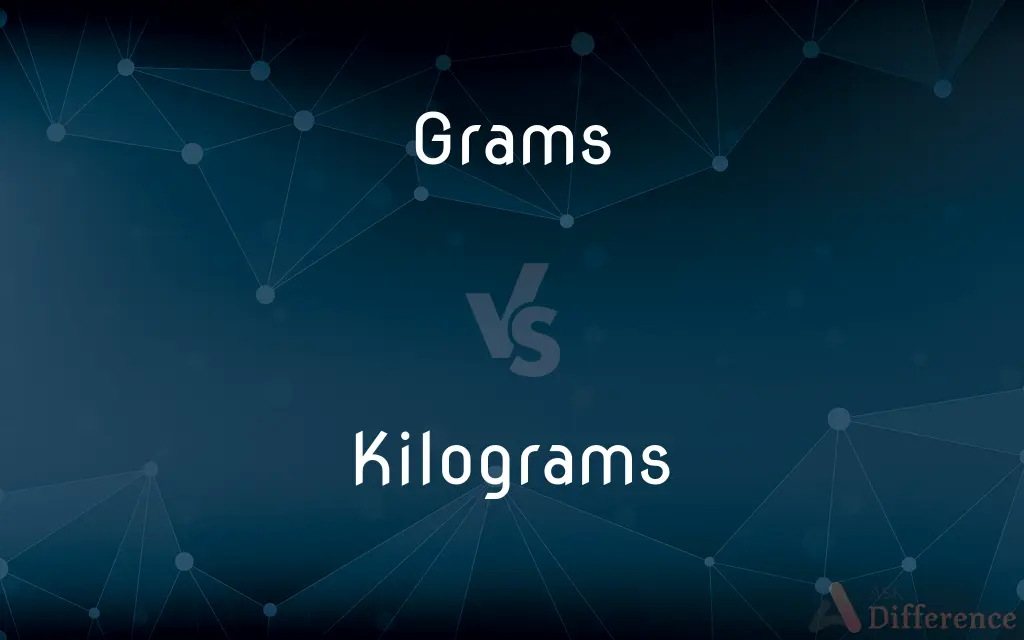Grams vs. Kilograms — What's the Difference?
By Tayyaba Rehman — Published on November 19, 2023
Grams (g) and Kilograms (kg) are units of mass, with 1 kilogram equaling 1,000 grams. Grams measure smaller masses, while kilograms measure larger ones.

Difference Between Grams and Kilograms
Table of Contents
ADVERTISEMENT
Key Differences
In the metric system, both Grams and Kilograms are fundamental units to measure mass. Grams, often abbreviated as "g", serve as a base unit for mass. Kilograms, on the other hand, are a derived unit, symbolized as "kg", where one kilogram equals one thousand grams.
When you think about the practical applications, Grams are frequently used to quantify smaller items or quantities. For instance, if you were measuring out ingredients for a recipe, spices might be measured in grams due to their lightweight. Kilograms, in contrast, are more suitable for heavier objects. For example, when you weigh yourself, the measurement is typically done in kilograms because of the larger mass involved.
Moreover, the conversion between Grams and Kilograms is straightforward, given the relationship between them. For any given weight in kilograms, multiplying by 1,000 will give the weight in grams. Conversely, to go from grams to kilograms, you would divide by 1,000.
From a global perspective, both Grams and Kilograms are widely adopted for various purposes, from scientific research to everyday activities. They're both part of the International System of Units (SI), which standardizes measurements across different fields and countries.
In conclusion, while Grams and Kilograms both measure mass, they're best suited for different scales of weight, with grams being the smaller unit and kilograms the larger.
ADVERTISEMENT
Comparison Chart
Unit Type
Base unit of mass
Derived unit of mass
Symbol
G
Kg
Relative Size
Smaller
Larger (1 kg = 1,000 g)
Typical Use
Measuring lightweight items/quantities
Weighing heavier objects/entities
SI Inclusion
Part of International System of Units
Part of International System of Units
Compare with Definitions
Grams
Grams quantify the weight of lightweight objects or small quantities.
The sugar packet contains 10 grams of sugar.
Kilograms
Grams quantify the weight of lightweight objects or small quantities.
The sugar packet contains 10 grams of sugar.
Grams
Grams, symbolized as "g", represent a basic metric unit for measuring mass.
The feather weighs just a few grams.
Kilograms
Grams function as the foundational weight unit in the metric system.
The jewelry piece weighed in at 50 grams.
Grams
Often found in cooking, grams provide accurate measurements for ingredients.
Add 100 grams of flour to the mixture.
Kilograms
Grams, symbolized as "g", represent a basic metric unit for measuring mass.
The feather weighs just a few grams.
Grams
Grams function as the foundational weight unit in the metric system.
The jewelry piece weighed in at 50 grams.
Kilograms
Often found in cooking, grams provide accurate measurements for ingredients.
Add 100 grams of flour to the mixture.
Grams
Commonly used in laboratories, grams offer precise measurements for small samples.
The chemical sample weighed 25 grams.
Kilograms
Commonly used in laboratories, grams offer precise measurements for small samples.
The chemical sample weighed 25 grams.
Grams
A grandmother.
Kilograms
Abbr. kg The base unit of mass in the International System, equal to 1,000 grams (2.2046 pounds). See Table at measurement.
Grams
Plural of gram
Kilograms
Kilogram force.
Grams
Grandmother
Kilograms
Plural of kilogram
Common Curiosities
Why is the abbreviation for grams "g" and for kilograms "kg"?
"g" stands for grams, and "kg" combines "kilo-", meaning thousand, with "grams".
When would I use grams in a recipe?
Grams are used in recipes for precise measurements, especially for small ingredients.
Can I use Grams and Kilograms interchangeably?
While they both measure mass, grams are used for smaller quantities, and kilograms for larger amounts.
Which is heavier, 1 gram or 1 kilogram?
1 kilogram is heavier, equivalent to 1,000 grams.
What do Grams measure?
Grams measure mass, typically of lightweight items or small quantities.
How do I convert kilograms to grams?
Multiply the number of kilograms by 1,000.
If I have 5,000 grams of something, how many kilograms is that?
That would be 5 kilograms.
How many grams are in a kilogram?
There are 1,000 grams in a kilogram.
Is my body weight typically measured in grams or kilograms?
Body weight is usually measured in kilograms.
Do all countries use grams and kilograms as standard measurements?
Most countries use the metric system, including grams and kilograms. The U.S. also uses pounds and ounces.
Are Grams and Kilograms the only units to measure mass?
No, there are other units like milligrams, tons, and pounds, but grams and kilograms are standard in the metric system.
Are Grams and Kilograms used globally?
Yes, they are part of the International System of Units, making them widely recognized and used.
In which professions are kilograms commonly used?
Kilograms are used in many professions, including healthcare, shipping, and scientific research.
What's the importance of understanding the difference between grams and kilograms?
Knowing the difference ensures accurate measurements, vital in various fields like cooking, science, and medicine.
How does the weight of a paperclip compare in grams and kilograms?
A paperclip typically weighs about 1 gram, or 0.001 kilograms.
Share Your Discovery

Previous Comparison
Hand Dryer vs. Paper Towels
Next Comparison
Return on Equity vs. Cost of EquityAuthor Spotlight
Written by
Tayyaba RehmanTayyaba Rehman is a distinguished writer, currently serving as a primary contributor to askdifference.com. As a researcher in semantics and etymology, Tayyaba's passion for the complexity of languages and their distinctions has found a perfect home on the platform. Tayyaba delves into the intricacies of language, distinguishing between commonly confused words and phrases, thereby providing clarity for readers worldwide.












































